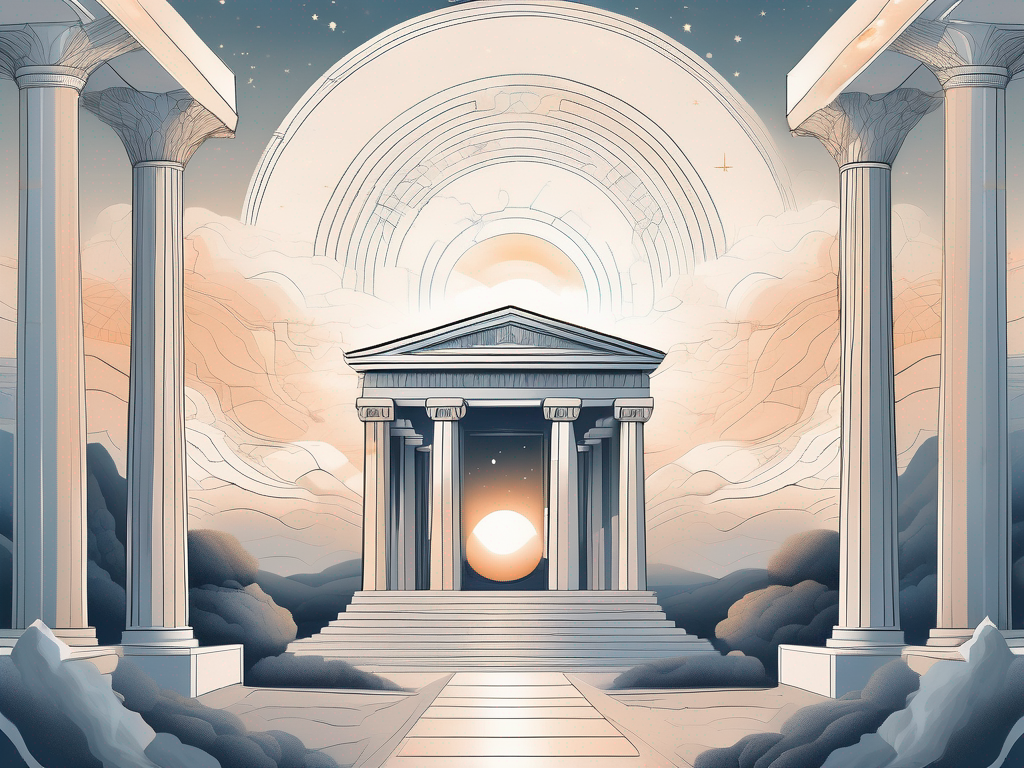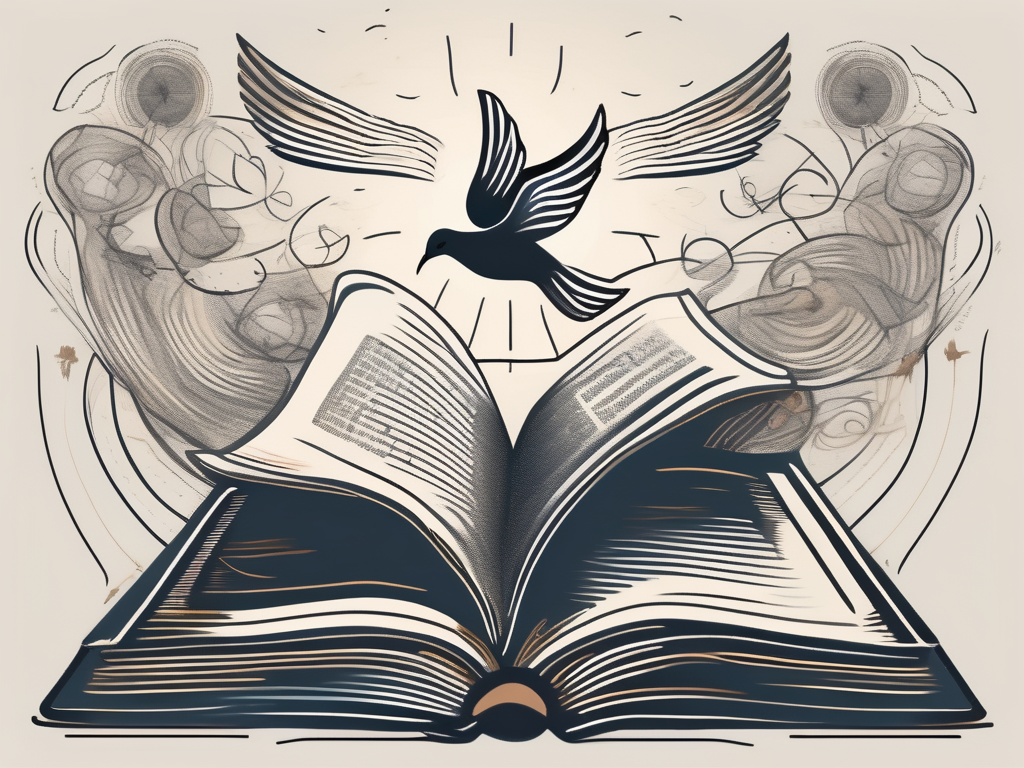Have you ever wondered what lies beyond the physical world? Have you found yourself pondering the existence of the spirit realm? Join us on a journey as we delve into the fascinating and enigmatic realm of spirits, exploring its conceptualization, historical perspectives, cultural interpretations, religious significance, theories and beliefs, methods of communication, and ethical considerations.
Understanding the Concept of the Spirit Realm
Let’s start by unraveling the very essence of the spirit realm. This ethereal dimension is believed to coexist alongside our own, filled with the energies and entities that go beyond our understanding. Throughout history, diverse cultures have contemplated this mysterious realm and developed unique interpretations.
The spirit realm, often referred to as the supernatural realm, is a captivating concept that has fascinated humanity for centuries. It is a realm that exists beyond the physical world, where the laws of nature as we know them do not apply. It is a place where the intangible becomes tangible, and the unimaginable becomes real.
Historical Perspectives on the Spirit Realm
The concept of the spirit realm is not a recent phenomenon. Ancient civilizations, such as the Egyptians and Greeks, embraced the idea of a spiritual realm inhabited by gods, goddesses, and other supernatural beings. They believed in an afterlife that closely intersected with the earthly realm, with the deceased continuing their existence in this spiritual dimension.
For the Egyptians, the spirit realm was intricately linked to their religious beliefs. They believed that the soul, or “ka,” would journey through the spirit realm after death, facing various trials and tribulations before reaching the ultimate destination of the afterlife. The gods and goddesses of ancient Egypt were believed to reside in this realm, guiding and protecting the souls of the departed.
The Greeks, on the other hand, had a complex understanding of the spirit realm. They believed in the existence of multiple realms, with the spirit realm being just one of them. In Greek mythology, the spirit realm was known as the “Underworld” or “Hades,” where souls would go after death. It was a realm ruled by Hades, the god of the dead, and was divided into different sections, each with its own purpose and inhabitants.
Different Cultural Interpretations of the Spirit Realm
As we explore the spirit realm, it becomes evident that various cultures have distinct perspectives on its nature. Native American traditions, for instance, associate the spirit realm with nature and consider it a vital part of their spirituality. They believe that everything in the natural world, from animals to plants, possesses a spirit or essence that connects them to the spirit realm. Native Americans often engage in rituals and ceremonies to communicate with these spirits and seek guidance and protection.
Meanwhile, Eastern philosophies like Buddhism emphasize the concept of reincarnation and the continuous cycle of life and death. In these belief systems, the spirit realm is seen as a temporary resting place for souls between incarnations. It is a realm where souls reflect on their past lives, learn valuable lessons, and prepare for their next journey on the wheel of life.
Other cultures, such as African and Indigenous Australian tribes, have their own unique interpretations of the spirit realm. They view it as a realm inhabited by ancestral spirits who continue to play an active role in the lives of the living. These ancestral spirits are believed to guide, protect, and provide wisdom to their descendants, forming a vital link between the past, present, and future.
As we delve deeper into the concept of the spirit realm, we discover a rich tapestry of beliefs and interpretations that reflect the diverse nature of human spirituality. It is a realm that sparks curiosity, wonder, and contemplation, inviting us to explore the depths of our existence and the mysteries that lie beyond.
The Spirit Realm and Religion
Religion often intertwines with beliefs about the spirit realm. Let’s dive into the connections between religion and the spiritual dimensions, focusing on Christianity, Buddhism, and indigenous belief systems.
Christianity and the Spirit Realm
In Christianity, the spirit realm is a place where angels, demons, and departed souls reside. The belief in heaven and hell, as well as the notion of divine intervention, shape the Christian interpretation of this alternate realm. The spiritual battles between good and evil are seen as a direct consequence of the existence of the spirit realm.
Within Christianity, the spirit realm is a source of both comfort and fear. Believers find solace in the idea that their departed loved ones are in a better place, residing in the heavenly realms. The concept of guardian angels offers a sense of protection and guidance, knowing that spiritual beings are watching over them.
On the other hand, the existence of demons and evil spirits in the spirit realm instills fear and caution. Christians believe that these malevolent entities can influence human lives, tempting individuals to stray from their faith and commit sinful acts. The spiritual battles fought between good and evil are seen as a reflection of the ongoing struggle within the spirit realm.
Spirit Realm in Buddhism
Buddhism introduces an intriguing perspective on the spirit realm. Departing from the idea of a distinct spiritual dimension, Buddhism views the spirit realm as interconnected with the physical realm through various states of existence. The goal is to transcend these realms and achieve enlightenment, escaping the cycle of rebirth.
In Buddhism, the spirit realm is not seen as a permanent dwelling place for beings but rather as a transient state of existence. It is believed that individuals can be reborn into different realms based on their actions and karma. These realms include heavenly realms, hellish realms, and various realms of existence in between.
By practicing meditation and following the teachings of Buddha, Buddhists aim to attain a state of enlightenment that allows them to break free from the cycle of rebirth and transcend the limitations of the spirit realm. This liberation is seen as the ultimate goal, leading to the cessation of suffering and the attainment of nirvana.
The Spirit Realm in Indigenous Beliefs
Indigenous belief systems acknowledge an intimate connection between the spiritual and physical worlds, with the spirit realm existing within everything around us. Nature, animals, and ancestors are revered as mediators between the realms, emphasizing the importance of maintaining harmony and respect in our interactions with the spirit realm.
In indigenous cultures, the spirit realm is not seen as a separate dimension but rather as an integral part of everyday life. The spiritual and physical realms are intertwined, and the boundaries between them are fluid. Indigenous peoples believe that spirits reside in natural elements such as mountains, rivers, and trees, as well as in animals and ancestral beings.
Rituals and ceremonies play a significant role in indigenous belief systems, serving as a means of communication and connection with the spirit realm. These practices aim to honor and appease the spirits, seeking their guidance, protection, and blessings. Indigenous communities often have shamans or spiritual leaders who act as intermediaries between the human and spirit realms, facilitating communication and healing.
Respect for the spirit realm is deeply ingrained in indigenous cultures, as it is believed that a harmonious relationship with the spirits is essential for the well-being of both individuals and the community as a whole. By recognizing and honoring the spirits, indigenous peoples strive to maintain balance and ensure the continued vitality of their traditions and way of life.
Theories and Beliefs about the Spirit Realm
While the spirit realm often falls outside the scope of scientific inquiry, it has sparked numerous theories and beliefs throughout the years.
Exploring the mysteries of the spirit realm has been a subject of fascination for scientists, paranormal investigators, and individuals seeking answers to the unknown. From scientific theories to paranormal perspectives, let’s delve deeper into the realm of the supernatural.
Scientific Theories about the Spirit Realm
Scientists, driven by curiosity, attempt to understand the mysteries behind the spirit realm. Some propose theories about parallel universes, suggesting that spirits exist in a different dimension, parallel to our own. This theory suggests that certain individuals possess the ability to bridge the gap between these dimensions, allowing communication with spirits.
Another scientific theory that has gained attention is the concept of quantum entanglement. This theory suggests that spirits may be energy forms that exist in a state of entanglement with the physical world. It proposes that these entangled particles can influence our reality, leading to paranormal phenomena such as ghostly apparitions and unexplained sounds.
Furthermore, cosmic energies have been theorized to play a role in the spirit realm. Some scientists believe that specific celestial events, such as planetary alignments or solar flares, can create energetic portals that allow spirits to interact with our world. These cosmic energies are thought to provide the necessary conditions for spirits to manifest themselves.
While these scientific theories are speculative and lack concrete evidence, they push the boundaries of scientific exploration, challenging our understanding of reality and the existence of the spirit realm.
Paranormal Perspectives on the Spirit Realm
In the realm of paranormal investigation, we encounter a multitude of beliefs about the spirit realm. Ghost hunters, mediums, and psychics claim to have firsthand experiences with spirits, providing a different perspective on the supernatural.
Ghost hunters, armed with various tools and equipment, embark on investigations to capture evidence of spirits. They document encounters with apparitions, capturing chilling photographs and videos that seem to defy logical explanation. Electronic voice phenomena (EVP) recordings, where disembodied voices are captured on audio devices, are often cited as compelling evidence of the spirit realm’s presence.
Mediums, individuals who claim to have the ability to communicate with spirits, play a significant role in paranormal perspectives. They act as intermediaries between the physical and spiritual worlds, relaying messages from the deceased to their loved ones. Mediumship sessions, filled with emotional reunions and detailed information, provide comfort and closure to those seeking contact with the spirit realm.
Psychics, with their heightened intuition and extrasensory perception, offer insights into the spirit realm. They claim to receive visions, feelings, and messages from spirits, providing guidance and predictions. While skepticism remains prevalent, the accuracy of certain psychic readings and the unexplainable information they provide continue to captivate and intrigue many.
These stories and experiences from paranormal investigators, mediums, and psychics contribute to the ongoing fascination with the spirit realm. They offer glimpses into a world beyond our comprehension, where the boundaries between the living and the dead blur, leaving us with more questions than answers.
Communicating with the Spirit Realm
Unveiling the secrets of the spirit realm often involves attempting to communicate with its inhabitants. Let’s explore some common methods used by individuals to bridge the gap between the physical and spiritual dimensions.
Mediumship and the Spirit Realm
Mediumship, the practice of connecting with spirits, has gained popularity throughout history. Mediums claim to channel the energy of departed souls, providing messages and insights from the spirit realm. Although skeptics question the authenticity of these encounters, many individuals find solace and guidance through this form of spiritual communication.
Dreams and the Spirit Realm
Dreams have long been seen as a potential gateway to the spirit realm. People report vivid dreams involving deceased loved ones or spiritual beings. Some interpret these dreams as meaningful messages or visitations from the spirit realm. Exploring the symbolism and significance of dreams can offer valuable insights into our connection with the spiritual dimensions.
Ethical Considerations in Spirit Realm Exploration
As we delve into the spirit realm, it is essential to reflect upon the ethical implications of our actions and beliefs.
Respect and the Spirit Realm
Respect for the spirit realm and its inhabitants is paramount. Whether exploring through religious practices or paranormal investigations, approaching the spirit realm with reverence ensures a harmonious engagement and safeguards against exploitation or disrespect of the spiritual forces at play.
Potential Dangers of Spirit Realm Exploration
While the spirit realm captures our fascination, it is crucial to acknowledge the potential dangers involved. From spiritual attachments to psychological distress, venturing into the unknown can have unintended consequences. Practitioners and explorers should be aware of the risks and exercise caution when embarking on their spiritual journey.
In conclusion, the spirit realm remains an alluring enigma, captivating the human imagination across different cultures and belief systems. Whether viewed through historical, religious, or paranormal lenses, exploring the mysteries of the spiritual dimensions offers us a glimpse into a realm that exists beyond our immediate perception. As we navigate through its intricacies, let us remain inquisitive, respectful, and mindful of the profound impact this exploration can have on our spiritual well-being.












